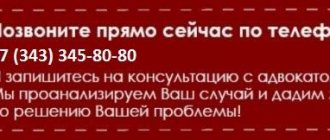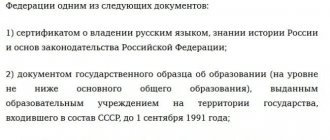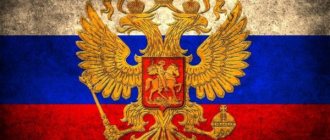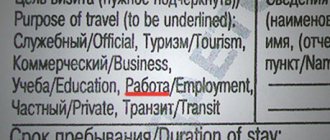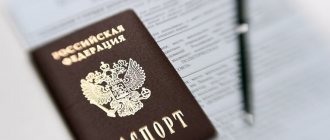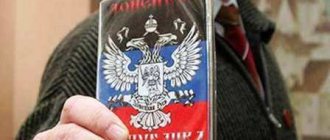Share on social media networks:
In January 2015, the Russian government approved a mandatory exam on knowledge of the Russian language.
Its passage has become a necessary condition for foreign citizens who want to live in the Russian Federation.
Many people mistakenly believe that the test only needs to be taken to obtain citizenship.
This is not true, because in fact, without a certificate of passing the test, the FMS may not even issue a temporary residence permit.
In this article you will receive all the necessary information about the certificate. We will tell you what the tests are, how to pass them, and how much it will cost. You should also find out which groups of people are exempt from the test.
Who needs a certificate? What is it for?

The test in Russian as a foreign language (abbreviated as TORFL) is necessary for people who are not residents of the Russian Federation.
The state checks the level of Russian language proficiency of foreign citizens at 3 levels:
- test for obtaining citizenship (a person must know at least 1300 words in Russian)
- test to obtain a work permit (it is enough to know 780 Russian words)
- test for obtaining a temporary residence permit or temporary residence permit (usually the same 780 words)
It is important
The citizenship test is more complex, but a certificate of successful completion is one of the required documents that must be attached to the citizenship application
If a person receives a work permit in Russia, it is logical that he needs to live somewhere. This means that he must also obtain a temporary residence permit (or residence permit).
To avoid misunderstandings, the certificate must be submitted when applying for each permit. But if a person already has a work permit, and he wants to apply for a temporary residence permit or residence permit, then he can attach not a certificate, but the permit itself
There are 3 groups of people who are exempt from presenting a certificate:
- men 65 years and older, women 60 years and older (they are regarded as people of retirement age)
- people with confirmed disabilities
- disabled people of group I
Where to get tested
The exam is conducted by state educational institutions, as well as various educational centers. The main requirement for such organizations is to have a license .
If you need to obtain a certificate in the Russian language for a temporary residence permit, then the approximate procedure will be as follows:
- Find an institution in your area that administers the exam for foreigners. It is better to clarify this information with the migration department of the Ministry of Internal Affairs.
- Apply for testing. You will also need to provide a passport, its translation certified by a notary, migration card, registration .
- Pay for the service. As of 2021, the average cost is 5,000 rubles.
- Come to the exam on the appointed date and time.
- The procedure takes on average 2.5 hours.
- If you complete the tasks well, you will receive a certificate within 10 days .
How to get a certificate?

To get a document, you need to pass a test. This happens according to the following algorithm:
- You need to clearly establish the purpose for which the certificate is needed and select the required level of testing
- Sign up for a test at one of the centers that conduct testing (they are located in educational institutions that are included in the state testing system)
- Make the necessary payment for the procedure
- Successfully pass the test
- Receive a certificate of successful completion from the center that conducted it
Testing system for foreign citizens in Russia
Knowledge testing is carried out in one of two formats:
- An exam in the Russian language, history and fundamentals of legislation of the Russian Federation, which, from January 1, 2015, foreign citizens and stateless persons who receive permission to carry out work activities in the territory of the Russian Federation (work permit, patent, temporary residence permit, residence permit) are required to pass ). To obtain Russian citizenship there is no requirement to pass this exam.
- Testing on the level of proficiency in Russian as a foreign language is taken by:
- applicants for Russian citizenship;
- persons entering Russian universities;
- foreign citizens who wish to voluntarily undergo testing, including for employment.
Order of the Ministry of Education and Science of the Russian Federation No. 255 dated April 1, 2014 defines 7 levels of Russian language proficiency and requirements for them:
- Elementary level of knowledge of the Russian language (TEU/A1) - the minimum level of language proficiency;
- Basic for migrant workers (TBUM/A1) - a level that is sufficient to pass a comprehensive exam in the Russian language, history and basic legislation of the Russian Federation;
- Basic (TBU/A2) - the level of knowledge of the Russian language for obtaining Russian citizenship, but it does not give the right to study in Russian educational institutions, with the exception of preparatory courses and departments;
- The first (TRKI-I/B1) is the level of knowledge for starting studies in Russian educational institutions, including higher professional education, i.e. universities, institutes and academies;
- The second (TRKI-II/B2) is the level required to obtain a bachelor’s or master’s degree, with the exception of a bachelor’s or master’s degree in philology;
- Third (TRKI-III/C1) - the level required to obtain a bachelor's degree in philology;
- The fourth (TRFL-IV/C2) is the level required to obtain a master’s degree in philology, which gives the right to all types of teaching and research activities in the field of the Russian language.
To obtain Russian citizenship, a basic level of A2 is sufficient.

For preliminary preparation, you can take an online test in the Russian language on the Internet
What is the Russian citizenship test?

Citizenship testing is the most difficult and serious type of test.
The general procedure is as follows:
- Before testing, the examiner provides instructions on how to perform the test. He names the exact time of the event and the rules by which you need to fill out the checklist
- After the instructions, you are given exam questions and a checklist in which you need to enter your answers.
- Phased testing is underway
The test itself is very similar to a school exam, so there is nothing special in the process of passing it. You just need to follow some rules, otherwise you may fail the test for “technical” reasons:
- You must fill out the sheet with a pen
- questions can only be asked before the exam begins - at the instruction stage
- When the exam is going on, you cannot talk to other participants
- You cannot use dictionaries, reference books and other auxiliary materials
When the test is completed, you need to give all the exam material to the examiner and turn in the test sheet.
The test is divided into 5 parts (subtests), for each of which a clear completion time is set:
- 45 minutes to read
- 45 minutes per letter
- 45 minutes for vocabulary and grammar
- 30 minutes listening time
- 30 minutes speaking time
Thus, the total test time is 195 minutes. Short breaks are possible between subtests. The order of the subtests remains unchanged, although there are cases where speaking and listening are swapped.
To successfully pass the test, you must score at least 66% correct answers on each subtest. If the test taker fails 2 or more subtests, the test is considered failed.
If only 1 subtest is failed, then you can retake it. For this you need to pay 50% of the cost of full testing. If you re-pass, you will not have to retake successfully passed subtests.
Info
If a retake of the subtest is required, the examiner issues a certificate. It is valid for 2 years, so you can retake the subtest only in the first 2 years after the main test
Exam Sections
Testing includes several blocks. One is designed to test knowledge of the Russian language - this section is the most voluminous.
The other two blocks are devoted to history and legislation. Let's look at each one separately.
Russian language
This section includes five subsections (subtests).
- Reading. As part of this subsection, the migrant will be asked to read a short text, for example, an advertisement for an employee. Further questions will be asked in the text. Of the three answer options, you will need to choose the correct one.
- Letter. In this subtest you need to write a short text yourself, for example, a postcard to your friend.
- Listening. The foreigner listens to a short audio recording and then answers questions regarding what was said in the audio.
- Vocabulary, grammar. This section contains sentences with missing words. The foreigner’s task is to choose from three options the word that, according to its meaning, should be used in the sentence.
- Speaking. The examiner asks questions to which the migrant must answer in detail. This part of the exam is recorded on video.
To confirm your knowledge of Russian, you need to score 70% of correct answers on each subtest.
Story
- RRVP
Is a residence permit certificate suitable for obtaining a temporary residence permit?
- Elena Voropaeva
- 19.05.2020
Testing for obtaining a temporary residence permit includes a block on the history of Russia. You will be asked 20 questions. Each of them will have three answer options.
In this block, knowledge of the main historical dates and events that influenced the development of the Russian state is tested. There are also questions about Russian rulers, historical figures, generals, and scientists.
To successfully pass history tests you need to score 50% correct answers .
Fundamentals of legislation
This block tests knowledge of Russian legislation. The section includes 20 multiple-choice questions. Many tasks are related to migration legislation, so preparing for the exam will be useful for a foreigner.
Here you also need to answer at least half of the questions .
Documents required to pass the exam

You must bring certain documents to testing:
- identification document (passport with notarized translation, residence permit for stateless persons, refugee certificate)
- a copy of this document (first page) and its translation (if it is a passport)
- receipt of successful payment for testing
Attention
A residence permit serves as proof of identity only for stateless people. Those who have a passport from another country must provide it
Sample documents
Why get a certificate and who should get it?
A certificate of knowledge of the Russian language is issued to foreign citizens (not residents of the Russian Federation) based on the results of completed tests.
According to the law, there are 3 types of testing, each of which is designed for the specific needs of a foreign citizen:
- Testing for obtaining Russian citizenship. The most difficult type of test: only Russian is taken, but its level is quite high. A foreigner must speak at least 1300 words of the Russian language.
- Testing to obtain a residence permit. The number of required words is less - 780. Comprehensive testing includes the Russian language, the history of Russia and the legislation of the Russian Federation.
- Testing for obtaining temporary residence registration. It’s also complex, but the questions are easier than a residence permit.
- Test for work permit. The simplest testing.
The received certificate must be attached when submitting documents, except in cases where you have in your hands any permission previously obtained. For example, if you already have a work permit, then to obtain permission for a temporary residence permit and temporary residence permit, you do not need to attach a certificate, but provide the permit itself.
According to the law, there are 3 categories of foreign citizens who are not required to provide a certificate:
- Men over 65 and women over 60. This category assumes retirement age and does not require testing.
- Non-residents with a certified disability;
- Disabled people of the first group.
How much does it cost to obtain a certificate?

Standard testing prices are as follows:
- citizenship test – 6,000 rubles
- test for residence permit or temporary residence – 5300 rubles
- patent test or work permit – 4900 rubles
Usually the prices are the same for all testing centers, but under certain conditions they may vary slightly. For example, in different centers the cost of the test includes the price of a test sheet and a pen (about 30 rubles).
Helpful advice!
To successfully pass the test, you can contact the test center for preparatory classes. One academic hour of such classes can cost 500-800 rubles
Attendance at classes is not mandatory; they are needed only by those people who do not know Russian well and are afraid of failing the test.
What is required to receive
According to the laws of the Russian Federation, you must have minimal knowledge of the language, history and legislation of Russia. Below I will list what exactly you should be able to do.
In Russian:
- be able to read small texts, for example, advertisements, signs, inscriptions, while understanding the content, grasping the general meaning and understanding additional information on them;
- be able to fill out a notice, form, questionnaire, application in various areas of life - for work, for a child’s school, etc.;
- understand by ear the meaning and details of dialogues and monologues, understand speech situations in various areas of life;
- take adequate part in dialogue on the proposed topic in various areas of life;
- have lexical-grammatical and phonetic-intonation skills and abilities, and also use them in various areas of life.
This is important to know: Do you need a patent if you have a temporary residence permit?
On the history of Russia:
- know important facts and events of Russian history, as well as their chronology;
- understand religious denominations and national and cultural traditions;
- know the names of the main political figures, as well as government officials who made a serious contribution to the development of science and culture in Russia.
According to the basics of Russian legislation:
- know the basics of the Constitution of the Russian Federation;
- understand the rights, freedoms and responsibilities of foreign citizens on the territory of the Russian Federation;
- know the rules of entry for foreign citizens, as well as the rules of residence on the territory of the Russian Federation;
- understand the basics of civil, family and labor law in Russia;
- know how to interact with government authorities in Russia;
- understand the basics of legal liability of foreign citizens staying in Russia;
- know the basic rules of interaction with consulates and embassies of the state from which the foreign citizen arrived.
In accordance with Federal Law No. 74 of 04.20.14 “On the legal status of foreign citizens in the Russian Federation” and Order of the Ministry of Education and Science of Russia No. 1156 of 08.28.14 “On approval of the form, procedure for conducting an exam in the Russian language, history of Russia and the fundamentals of legislation of the Russian Federation and requirements for the minimum level of knowledge required to pass the specified exam,” from January 1, 2015, foreign citizens wishing to obtain a temporary residence permit must undergo testing and confirm their knowledge with the appropriate certificate.
TRKI exam: who needs it and why?
Any foreigner can take the Test of Russian as a Foreign Language (TRFL) and receive a certificate of language proficiency. The test was developed in 1995 by professors from four universities: Moscow State University, RUDN University, Pushkin Institute and St. Petersburg State University. These are the universities that issue certificates, but to take the exam you can contact the nearest accredited center. They are in different cities of Russia and even in other countries.
Levels of Russian proficiency
TRFL allows you to identify your level of Russian language proficiency. There are 6 levels in total, but only 4 of them are certification levels.
A1 - elementary level. Having command of the language at this level, a foreigner can read simple texts, understand advertisements and banners. Can participate in dialogue and answer questions. Talk about yourself, your friends, family and free time. The lexical minimum is 780 words.
A2 - basic level. Foreigners who know the language at a basic level can carry out more complex conversations, read texts and understand not only basic but also additional information. They can also fill out questionnaires and forms. The lexical minimum is 1,300 words. A certificate of knowledge of Russian at level A2 is sufficient to obtain citizenship.
A certificate of completion of the TRFL will definitely be useful to philology students and journalists. Photo: pexels.com
B1 is the first certification level. Foreigners must read and understand literary and journalistic texts, maintain dialogues on a wide range of topics, and be able to formulate and express their own opinions based on the texts they have read and heard. The lexical minimum is 2,300 words.
B2 is the second certification level. Those who speak Russian at this level read journalistic and artistic texts with elements of reasoning and a pronounced author’s assessment. They can start a dialogue themselves, freely express and defend their opinions during the conversation. The lexical minimum is 10,000 words.
C1 is the third certification level. This level allows you to read and understand highly specialized texts and freely discuss philosophical topics. The lexical minimum is 12,000 words. Foreigners must know the language at level C1 in order to receive a diploma at a Russian university or work as a philologist, journalist, editor, or translator.
C2 is the fourth certification level. It is close to the level of native speakers. To receive a C2 certificate, a foreigner must be able to communicate freely on any topic and construct sentences competently and logically, both in writing and orally. The lexical minimum is 15,000 words. Language proficiency at the C2 level is necessary for foreigners who want to conduct teaching or scientific activities in the field of the Russian language.

